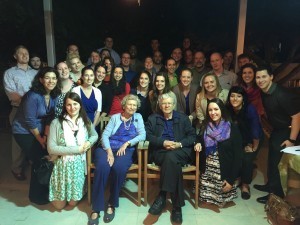 A highlight of our trip every year is the time we get to spend with Justice Aharon Barak and his wife Judge Elika Barak. Justice Barak is the former President of the Israeli Supreme Court, hailed as the father of Israel’s constitutional revolution and even cited by Justice Elena Kagan as one of her judicial heroes. Judge Barak was the former deputy chief of the Labor Court. It is a truly special evening.
A highlight of our trip every year is the time we get to spend with Justice Aharon Barak and his wife Judge Elika Barak. Justice Barak is the former President of the Israeli Supreme Court, hailed as the father of Israel’s constitutional revolution and even cited by Justice Elena Kagan as one of her judicial heroes. Judge Barak was the former deputy chief of the Labor Court. It is a truly special evening.
Student Dejan Adzic recounts:
One of the most valuable and interesting experiences of the Israel 2015 trip was a group dinner at the home of former Justice Barak and his wife. The Barak’s were terrific hosts and their hospitality was remarkable and far exceeded my expectations. In addition to the great food, I was really surprised by how pleasant and approachable Justice Barak really is. He went above and beyond in his attempts to answer everybody’s questions and to give each student an opportunity to engage him in a conversation. He spoke tirelessly for nearly two hours with forty students asking thought provoking questions about Israel’s judicial system, the Constitution, labor and immigration issues, as well as the unavoidable security concerns and the two state solution. Justice Barak even found time to speak to the guests about the fruits in his garden, letting students take mandarins as edible souvenirs from the memorable dinner.
One of the most interesting topics of discussion was Justice Barak’s discussion on the U.S. Constitution and the originalist interpretation of the document. Justice Barak criticized the originalist approach when applied to a rigid constitutional framework that makes amendments difficult to accomplish. He believes that an originalist approach coupled with a rigid constitutional framework hinders the concept of constitutionalism. Another issue that is prevalent in Israel, but overshadowed by more pressing security concerns, are immigration and employment law issues that Israel faces. Israel has approximately 50,000 illegal immigrants working within its borders. These immigrants could easily be nationalized because most of them have been living in Israel for many years and their nationalization would benefit the country and eliminate the immigration problem. However, largely due to more pressing security concerns and other political issues in the Middle East, this employment and immigration problems are usually not at the focal point of Israeli politics. As Justice Barak noted, “It’s a tough neighborhood.”
